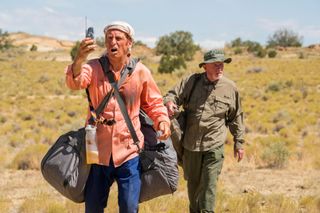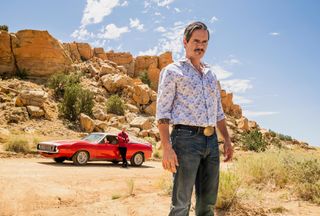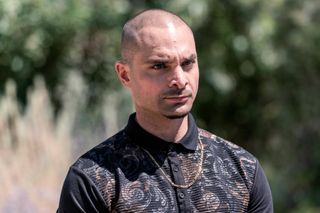Better Call Saul is the best show on TV, and season 5 just proved it
Better Call Saul is a smart, intense, stylish drama where the acting, storytelling and cinematography are miles ahead of most other shows.

Update: Better Call Saul season 6 is upon us. Here's how to tune in
Two years ago, just before Season 4 of Better Call Saul aired, I wrote about how Better Call Saul was the best show on TV, bar none. Having just watched the Season 5 finale last night, I’m pleased to report that this is still the case.
Better Call Saul is a smart, intense, stylish drama. Its acting, storytelling and cinematography are miles ahead of what you'll find on most other primetime shows. The fact that we have only one season to go is bittersweet.
- Watch the best streaming services
- The best streaming devices can connect you with your favorite shows
- Check out the best Roku channels
A lot of things have changed about Better Call Saul in the last two seasons, and with only 10 episodes left to go, we should expect a few more twists and turns along the way. The end of Better Call Saul Season 6 will dovetail with the beginning of Breaking Bad Season 1, and Saul Goodman’s (Bob Odenkirk) life has to collapse just a little bit more before he gets to where we first met him.
With 83% of the show behind us, it’s time to look back on what’s made Better Call Saul so good, and discuss why it’s maintained its unimpeachable level of quality for such a long time.

Better Call Saul gets the basics right
There’s no secret to why Better Call Saul works so well: It’s a well-written show with a talented cast and crew. It sounds simple, but if every show had these qualities, primetime TV would be a cultural mecca instead of a wasteland. The level of care and nuance that goes into every episode of Better Call Saul. I would love to see how many drafts each script goes through, and how many takes each scene requires; I would not be at all surprised if there’s enough cutting room floor material to create another 50 episodes.
Analyzing the screenwriting in Better Call Saul could be an article all by itself, but I think there are two main qualities that set it apart from most other shows. The first is how the show embraces silence; the second is how the show resists ultimatums.
Without going too deep down the Film Theory 101 rabbit hole, film and television are visual mediums. As such, dialogue isn’t as important to them as it is in, say, a novel or a radio drama. (For a good example of why visuals always trump dialogue onscreen, watch the first 20 minutes of 2001: A Space Odyssey.) TV usually needs more dialogue than movies, but Better Call Saul still economizes what its characters have to say. What they leave unsaid is often just as important.
The best recent example of this is in “Bagman,” possibly the best episode in Season 5.. As a quick refresher, Saul agrees to pick up $7 million in cash to bail a dangerous client out of jail. The pickup goes awry, and he and taciturn fixer Mike Ehrmantraut (Jonathan Banks) must trek across the desert while evading an armed pursuer in an SUV. It’s essentially a short action/thriller film in the guise of a serial drama.
At every major plot point, the temptation to have characters spout exposition must have been overwhelming. But Saul and Mike rarely talk — even when it seems like they would need to. They coordinate complex actions — such as pushing a car into a ditch, finding adequate (if disgusting) water supplies and creating an elaborate trap for their pursuer — with just a few words each.
When they talk, it’s often more to reveal character traits than to expound on their situation. This economy of words lets the episode focus on vast, sweeping shots of the New Mexico landscape and environmental storytelling involving terrain, height and obstacles along the way. This could have been a noisy, frantic episode; the fact that it’s quiet and calm until it’s not makes the story tense and unpredictable instead.

Better Call Saul's stellar characters
I touched on the “no ultimatums” point a few years ago, and the trend has continued since then. In every season of Better Call Saul, I’ve been impressed by how realistically the characters act. It’s not that the show itself is tremendously grounded — you can’t make a crime drama about an ambulance-chasing con artist without going at least a little over-the-top — but that the characters don’t have rigid worldviews.
Kim Wexler (Rhea Seehorn) demonstrates just how flexible the show’s characters can be. Season 5 is, essentially, a protracted exercise in seeing just how far Saul can push her before she finally gives up on him. He changed his identity, he helped get criminals back on the street, he withheld important information and he lied, again and again, until the last lie nearly cost him his life.
A lesser show would have had Kim storm out in a huff at some point, telling Saul that he’s finally gone too far, and that he’s lost the best part of himself, and so on. Instead, Kim sometimes rages and sometimes accepts, but we learn that she tolerates so much of Saul’s bad behavior because she has the same impulses. Seehorn has done a masterful job balancing Kim’s need to help with her desire to harm, and to say that she’s become the show’s secret weapon would still, somehow, be underselling her contribution.
Mike’s arc is another perfect example of how nuanced characters lead to more interesting situations. It’s easy to view Mike as a battle-hardened stoic, who has a rigid set of rules that have kept him alive. And yet, we’ve seen over and over how he’s not quite as inflexible as he seems. Murdering a man in cold blood isn’t just business as usual; it sends him into a spiral of alcoholism and random violence. When Nacho Varga (Michael Mando) wants out of the cartel, Mike (almost) sympathizes with Nacho’s dilemma, and acts on the younger man’s behalf. Mike even shares incredibly sensitive information with Saul because he, too, understands what it’s like for criminal connections to threaten a loved one.
And as for Saul himself, I really do think that only a comic actor like Odenkirk could infuse the protagonist with such joy and such pathos. Saul has become a Pagliacci figure, whose good humor goes only so far to mask the turmoil that he’s hiding just underneath the surface. With every criminal act, Saul’s moral center slides just a little further away, and it’s been incredible to watch Odenkirk show us the transition over the course of five years.

Why Better Call Saul beats other shows
Interestingly, the last time I wrote this piece, my coworkers suggested five other TV dramas that were more or less on the same level. When I asked this time, they could come up with only two. Either Better Call Saul has gotten better, or others shows have let their quality slip, but it’s becoming that this show is very nearly in a class of its own.
Still, the two comparable shows that came up were Succession and Westworld. It’s difficult to pit the three shows against each other, since Better Call Saul is a straight drama, Succession is a satire and Westworld is science-fiction. But if I’m going to make the claim that Better Call Saul is the best show on TV, I should at least attempt to qualify why it beats the competition.
Regarding Succession, it’s hard to find a single negative thing to say about the show. It’s funny, it’s incisive and it’s unpredictable. Other writers have declared that Succession is the best show on TV, and it’s hard to argue with the merits they propose.
The only good argument I have at my disposal is that Better Call Saul keeps a rock-solid tone, rather than trying to balance comedy and drama. Yes, Better Call Saul is sometimes very funny, but the humor is always in service of the larger crime-thriller story. Succession wants to tell a story, but it also wants to make you laugh, and every once in a blue moon, the two can be at odds.
Westworld is still one of the most compulsively watchable sci-fi dramas on TV, but it seems clear that the show is beginning to put style over substance. Season 3 has been more convoluted and over-the-top than previous outings. When it’s firing on all cylinders, it’s tremendously entertaining — and when it’s not, the metaphors ring a bit hollow, and the scientific principles don’t seem quite as cohesive as they should be.

Looking ahead for Better Call Saul
In any case, Better Call Saul has had five incredible seasons, and all that’s left now is to finish strong. When you consider that the show is a prequel with a predetermined endpoint, it had the odds stacked against it, but still managed to demonstrate that it had a story worth telling.
Part of me hopes this is our last outing in the Breaking Bad mythos — it’s been pretty thoroughly plumbed by now. But then again, if Better Call Saul could surprise us, who’s to say that another spin-off couldn’t do the same?
Sign up to get the BEST of Tom’s Guide direct to your inbox.
Upgrade your life with a daily dose of the biggest tech news, lifestyle hacks and our curated analysis. Be the first to know about cutting-edge gadgets and the hottest deals.
Marshall Honorof is a senior editor for Tom's Guide, overseeing the site's coverage of gaming hardware and software. He comes from a science writing background, having studied paleomammalogy, biological anthropology, and the history of science and technology. After hours, you can find him practicing taekwondo or doing deep dives on classic sci-fi.

